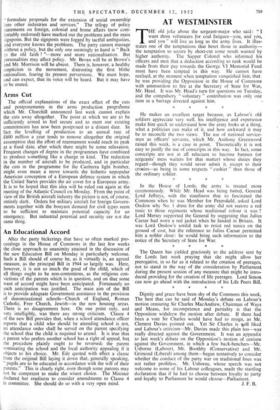An Educational Accord
After the party bickerings that have so often marked pro- ceedings in the House of Commons in the last few weeks the close approach to unanimity attained in the discussion of the new Education Bill on Monday is particularly welcome. Such a Bill should of course be, as it, virtually is, an agreed measure, as the principal Bill in 1944 so largely was. Here, however, it is not so much the good of the child, which of all things ought to be non-contentious, as the religious con- victions of the parents which is in question, and on that some want of accord might have been anticipated. Fortunately no such anticipation was justified. The main aim of the Bill is to provide adequate Government assistance in the provision of denominational schools—Church of England, Roman Catholic, Free Church, Jewish—in the new housing areas. There is no disagreement here. On one point only, and very intelligibly, was 'there any strong criticism. Clause 4 of the new Bill provides that, when a school attendance officer reports that a child who should be attending school is not, an attendance order shall be served on the parent specifying the school that the child is required to attend. It is true that a parent who prefers another school has a right of appeal, but the procedure plainly ought to be reversed; the parent nominating the school and the local authority appealing if it objects to his choice. Mr. Ede quoted with effect a clause from the original Bill laying it down that, generally speaking, " pupils are to be educated in accordance with the will of their parents." This is clearly right, even though some parents may not be competent to make the wisest choice. The Minister declared her readiness to consider amendments to Clause 4 in committee. She should do so with a very open mind.


































 Previous page
Previous page